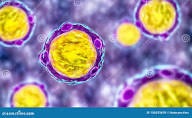Gut inflammation caused by one species of gut microbe, cured by another
Mar
26
Generally, Blastocystis, the world’s most common protist–a form of unicellular microscopic organism, can lead to a healthy gut for some individuals, and be problematic for others.
Researchers at the National University of Singapore (NUS) studied the biology of Blastocystis (ST7), Professors Yong Loo Lin and Kevin Tan from the school’s Department of Microbiology and Immunology, and found that this rare subtype weakens the gut and immune system. Blastocystis ST7, an intestinal bacteria more common among Asian people, produces indole-3-acetyldehyde (I3AA) which which blocks healthy bacteria in our gut when it metabolizes, according to a September 29, 2023 article in Medical Express (1).
In a mouse study on the topic, scientists saw a reduction of anti‐inflammatory Treg cells and simultaneous expansion of pro‐inflammatory Th17 responders, according to Embopress.org (2). Blastocystis ST7 effectively degrades tryptophan, an essential amino acid needed for normal human growth, especially in babies (3).
Researchers also discovered that lactobacillus—commonly found in foods like yogurt, cottage cheese, sourdough bread, could aid in curing patients from Blastocystis ST7-associated diarrhea.


